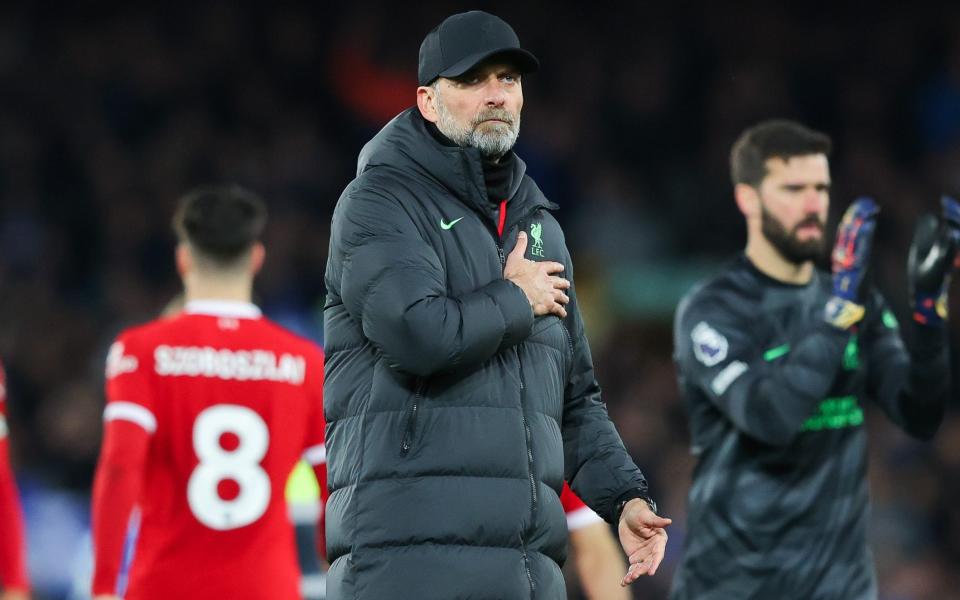
There is one consolation for Liverpool on the back of the desperate Merseyside derby defeat; replacing Jurgen Klopp is not the ‘impossible job’.
On the pitch, at least.
Reality has bitten at Anfield. Liverpool were clinging to the idea of beating Manchester City and Arsenal to the title despite lingering squad deficiencies. The quality of champions has never been there, too many flaws to sustain a challenge which, in truth, has gone on longer than anticipated.
Klopp’s successor, who it now appears will be Feyenoord’s Arne Slot, has plenty to improve after a season which has ultimately promised more than it delivered. No coach arriving at Anfield should consider it an unattainable challenge to make his first year at Liverpool better than Klopp’s last.
That’s the good news. The bad news is the man most capable of overseeing the next step for this Liverpool team is leaving.
If Klopp was in charge next season, Liverpool would move forward and challenge again at home and in Europe. With Slot, that absolute belief will give way to hope.
That’s not intended in any way as a criticism of the incoming Dutchman. Once Klopp announced he was going and Xabi Alonso ruled himself out, Liverpool’s options were limited. No matter how brilliant Slot is – and no-one wins a league title or leads a side to a European final without serious credentials – the next coach was always going to be highly regarded, but not one to necessarily get pulses racing.
There is no-one available to replicate Klopp’s aura, authority and natural connection with the supporters – that ‘X-factor’ which is so elusive.
Since the Slot news broke, I have heard and read many perspectives suggesting that the choice makes sense tactically and how the data regarding Feynoord’s style makes him a natural fit.
Slot is an appointment made with the head rather than the heart. Klopp’s appeal was to the head and heart.

When Klopp joined in 2015, Liverpool supporters were grateful he chose the club when he could have waited for any in the world. When Slot arrives, he will be grateful Liverpool chose him and needs to justify the selection.
There is nothing new or strange about there being no emotional connection. Most coaches at any club arrive needing to win the fans over, greatness being earned rather instantly thrust upon them. Klopp was an exception because he arrived as a double Bundesliga winner with Champions League pedigree. Many followed his work and felt he was a Liverpool manager-in-waiting.
For the first time since Rafa Benitez arrived having just won La Liga and the UEFA Cup with Valencia, Liverpool had a ready-made, elite coach – a manager of substance to worry their rivals. Is the same true of Slot? The appointment is intriguing rather than exciting.
For the last nine years, Liverpool have possessed one of the top two managers in the world. They are now gambling on the next big thing rather than appointing a proven, real deal.
‘I would prefer a proven winner’
I would have given more thorough consideration to a coach like Thomas Tuchel who took on and beat Pep Guardiola in the ultimate test – a Champions League final. Tuchel followed Klopp at Mainz and Borussia Dortmund and did well. It has not worked out at Bayern Munich this season, but you only have to look at Carlo Ancelotti and Unai Emery to recognise how top coaches recover from setbacks.
If another English club takes Tuchel, that would convince me they will significantly improve, but my sense is Liverpool don’t want a coach with a reputation for being fractious.
I would prefer a proven winner who could be difficult to manage to a coach who might be easy to manage but still have everything to prove.
My overriding concern is this: does Slot move to England ready to take on Guardiola for the Premier League and Champions League?
The new Liverpool manager must say from the outset he is here to win, not just compete.
After the Klopp years, no-one at Liverpool has any appetite to hear about transitional periods, seasons of consolidation or the ‘minimum requirement’ of Champions League qualification. Klopp’s triumph was extinguishing moderate expectations, re-establishing Liverpool as a team to be feared.
This is not 2010, 2012 or 2015 when significant reconstruction was necessary. The club has a base on which to improve next season, with a squad still technically in the title race with four games left – albeit they now need an unlikely set of results to win it.
The direction must be onwards, despite changes at the top.
Liverpool seem to be moving into an era where they want the coach’s priority to be solely on preparing the team, while Michael Edwards and Richard Hughes assume most responsibility to construct a squad. The new hierarchy never gave the impression they were looking for the next Klopp – a force of nature who would fight the necessary battles to ensure the squad was what he wanted.

Appointing a manager who will defer to the executives is a good idea in theory. In practice, the dynamics shift quickly.
It is naive to believe a successful Liverpool coach will not become the figurehead, or spokesman whose every word chimes with the fans.
Managers are thrust forward to speak in three press conferences a week, the voice of the club whether they or their bosses like it or not. The face has to fit, and they must speak the language of the fans. That is not just true at Liverpool, but I would argue there is no club or city where it is so important. It is the culture of the club and will not change.
Klopp never had to work on that. It came naturally.
For my former coaches, Gerard Houllier and Rafa Benitez, it evolved over time, helped by trusted advisors whose insight they valued. Once they were established and won trophies, they were empowered by their relationship with the Kop. There were times when it was argued they had too much power and control because the fans would always back their judgement over the executives. The same has been said of Klopp, and the fact Edwards left as Sporting Director only to return to the Fenway Sports Group fold in the immediate aftermath of the manager handing in his notice is revealing of previous power struggles. Liverpool’s recruitment policy has undoubtedly been more erratic since Edwards stepped down in 2022, big money signings like Darwin Nunez lacking the consistency to justify the fees.
Slot will be the symbol of the new regime and a different approach towards what Liverpool hope is the same destination.
Between 2006 and 2019, Liverpool only won the Carabao Cup. In the last five years, they have won everything and were unlucky not to win more.
Klopp is the single most important reason for that success. Once he is gone, it will not just be Slot’s reputation on the line, but that of those who believe him ready to step into such a legend’s shoes.
